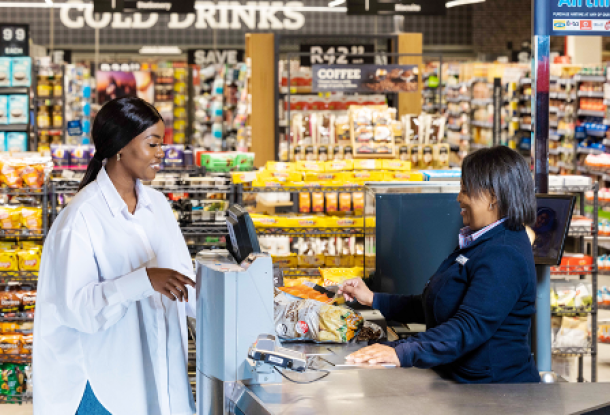
Retail trend riptides: time to sink or swim
By Nicola Allen – Senior Retail Analyst, Trade Intelligence
Retail trends do not occur in isolation; they are the result of macro influences that shape consumer and shopper behaviour and retailer strategies. In the ever-evolving world of retail, understanding the broader landscape is essential to anticipating and adapting to emerging trends.
A new report by Trade Intelligence offers a nuanced understanding of the interplay between macro factors, global shifts, evolving shopper behaviours, and the strategies adopted by local grocery retailers. The report dissects their implications for the South African retail sector and its stakeholders—implications that could have a profound impact.
The Trade Intelligence team is proud to share some insights and considerations from the report.
Global mega-shifts: The ripple effect on retail
Global mega-shifts are reshaping the world we live in, creating a ripple effect, and influencing shopper behaviour, supply chains, and market dynamics.
Economic turbulence has impacted most countries around the world and is unlikely to wane in the short term. Elections across the globe have made businesses increasingly risk-averse and investment-shy. In 2024, over 2 billion people—a quarter of the world’s population—will go to the polls, including in the US, UK, EU, Russia, India, Taiwan and South Africa. Meanwhile, geopolitical conflict in Ukraine and the Middle East is wreaking havoc, and the global energy crisis is intensifying the race to net zero.
These shifts have a profound impact on the retail landscape. According to the World Bank, the impact of the Israel-Hamas conflict on commodity prices to date has been muted. However, an escalation in the conflict could drive up commodity prices (especially oil) and disrupt key trade routes.
Overall, these trends and events combine to paint an unsettling picture of a fragile world, and even the glimmering possibilities posed by artificial intelligence cannot brighten this picture enough to lift the mood.
Global retail trends: Swirling currents and eddies
As with every facet of society, the retail industry is having to adapt constantly to meet the rapidly evolving needs of shoppers and other retail stakeholders.
The convergence of online and offline worlds is reshaping the retail landscape in which shoppers are both more demanding and less loyal. Retailers’ ingenuity and shopper-centric strategies play a pivotal role in navigating this blended retail space. Our report provides insights into the innovative approaches retailers are adopting to stay ahead in this dynamic environment.
South Africa in 2024: Navigating rough economic seas
Let’s dive into the economic context impacting the retail trade—the deep and murky waters of the South African economy. High inflation rates, constrained economic growth, energy supply struggles, the rising cost of living, and dismal consumer confidence all continue to contribute to a challenging trading landscape.
One bright spot in the gloom is that employment in Q3/2023 finally exceeded the pre-pandemic level at 16.7 million people, however, youth unemployment remains dire.
Understanding these macro factors is crucial for consumer goods brands and retailers aiming to navigate the intricate web of challenges and opportunities that define the South African retail space. These may be rough seas to navigate in the coming year, but at least (or rather, unfortunately), these are not uncharted waters, and local retailers are known for their buoyancy.
Local retail trends: Full steam ahead
South Africa’s retailers have shown themselves to be among the best globally, and we are increasingly delighted to see how close our local retail industry is to our global counterparts and the trends that are shaping the industry globally.
The challenge remains to balance the needs of shoppers (whether for more personalisation, faster delivery, more conveniently located stores, better prices, or an elevated shopping experience) with the squeeze for margin. Interestingly, instead of revenue from the sale of goods, retailers are focusing beyond this space on revenue from data monetization and cost containment through the leveraging of technology, AI and ESG savings and rebates.
Hoist the sail or drop anchor
In the current fragile context, consumer goods brands and retailers cannot afford to have strategic blind spots. Success requires a clear vision, the right information, and well-calibrated GPS. The Trade Intelligence Retail Trends resources provide essential insights to chart the journey ahead.
About Trade Intelligence
Trade Intelligence is South Africa’s leading source of consumer goods retail research, insights, and capability-building solutions that enable effective and profitable trading relationships and inform future-fit strategies.
TI’s expertise covers the FMCG environment, the major retail and wholesale players, the informal retail channel, as well as emerging retail and shopper trends.
News Category
- International retailers
- On the move
- Awards and achievements
- Legislation
- Wine and liquor
- Africa
- Going green
- Supplier news
- Research tools
- Retailer trading results
- Supply chain
- Innovation and technology
- Economic factors
- Crime and security
- Store Openings
- Marketing and Promotions
- Social Responsibility
- Brand Press Office
Related Articles

Two local businesses see a gap as food and groc...

SARS launches WhatsApp channel to help check ta...

Shoprite launches online shopping and bulk deli...

Sixty60 promises lightning-fast delivery of 10 ...


